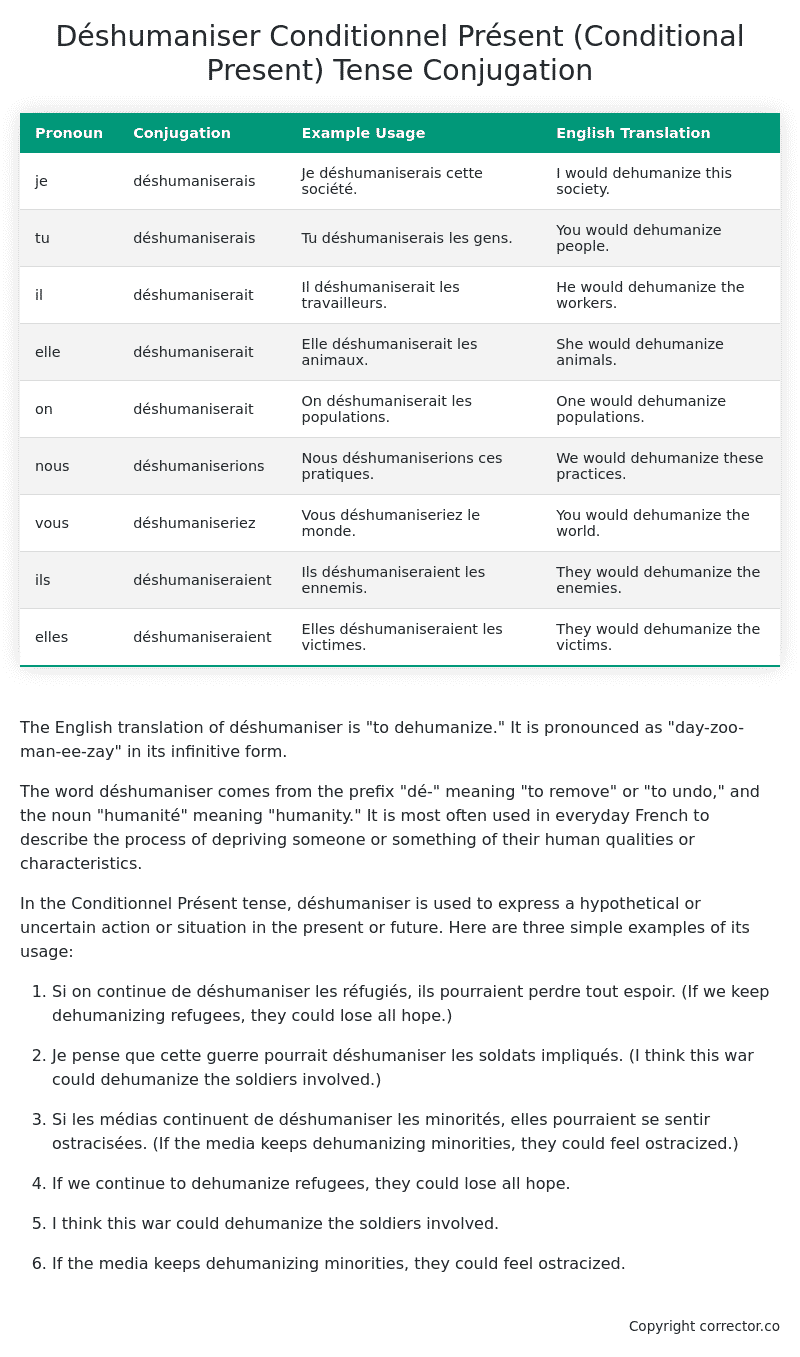Conditionnel Présent (Conditional Present) Tense Conjugation of the French Verb déshumaniser
Introduction to the verb déshumaniser
The English translation of déshumaniser is “to dehumanize.” It is pronounced as “day-zoo-man-ee-zay” in its infinitive form.
The word déshumaniser comes from the prefix “dé-” meaning “to remove” or “to undo,” and the noun “humanité” meaning “humanity.” It is most often used in everyday French to describe the process of depriving someone or something of their human qualities or characteristics.
In the Conditionnel Présent tense, déshumaniser is used to express a hypothetical or uncertain action or situation in the present or future. Here are three simple examples of its usage:
-
Si on continue de déshumaniser les réfugiés, ils pourraient perdre tout espoir. (If we keep dehumanizing refugees, they could lose all hope.)
-
Je pense que cette guerre pourrait déshumaniser les soldats impliqués. (I think this war could dehumanize the soldiers involved.)
-
Si les médias continuent de déshumaniser les minorités, elles pourraient se sentir ostracisées. (If the media keeps dehumanizing minorities, they could feel ostracized.)
-
If we continue to dehumanize refugees, they could lose all hope.
-
I think this war could dehumanize the soldiers involved.
-
If the media keeps dehumanizing minorities, they could feel ostracized.
Table of the Conditionnel Présent (Conditional Present) Tense Conjugation of déshumaniser
| Pronoun | Conjugation | Example Usage | English Translation |
|---|---|---|---|
| je | déshumaniserais | Je déshumaniserais cette société. | I would dehumanize this society. |
| tu | déshumaniserais | Tu déshumaniserais les gens. | You would dehumanize people. |
| il | déshumaniserait | Il déshumaniserait les travailleurs. | He would dehumanize the workers. |
| elle | déshumaniserait | Elle déshumaniserait les animaux. | She would dehumanize animals. |
| on | déshumaniserait | On déshumaniserait les populations. | One would dehumanize populations. |
| nous | déshumaniserions | Nous déshumaniserions ces pratiques. | We would dehumanize these practices. |
| vous | déshumaniseriez | Vous déshumaniseriez le monde. | You would dehumanize the world. |
| ils | déshumaniseraient | Ils déshumaniseraient les ennemis. | They would dehumanize the enemies. |
| elles | déshumaniseraient | Elles déshumaniseraient les victimes. | They would dehumanize the victims. |
Other Conjugations for Déshumaniser.
Le Present (Present Tense) Conjugation of the French Verb déshumaniser
Imparfait (Imperfect) Tense Conjugation of the French Verb déshumaniser
Passé Simple (Simple Past) Tense Conjugation of the French Verb déshumaniser
Passé Composé (Present Perfect) Tense Conjugation of the French Verb déshumaniser
Futur Simple (Simple Future) Tense Conjugation of the French Verb déshumaniser
Futur Proche (Near Future) Tense Conjugation of the French Verb déshumaniser
Plus-que-parfait (Pluperfect) Tense Conjugation of the French Verb déshumaniser
Passé Antérieur (Past Anterior) Tense Conjugation of the French Verb déshumaniser
Futur Antérieur (Future Anterior) Tense Conjugation of the French Verb déshumaniser
Subjonctif Présent (Subjunctive Present) Tense Conjugation of the French Verb déshumaniser
Subjonctif Passé (Subjunctive Past) Tense Conjugation of the French Verb déshumaniser
Subjonctif Imparfait (Subjunctive Imperfect) Tense Conjugation of the French Verb déshumaniser
Conditionnel Présent (Conditional Present) Tense Conjugation of the French Verb déshumaniser (this article)
Conditionnel Passé (Conditional Past) Tense Conjugation of the French Verb déshumaniser
L’impératif Présent (Imperative Present) Tense Conjugation of the French Verb déshumaniser
L’infinitif Présent (Infinitive Present) Tense Conjugation of the French Verb déshumaniser
Struggling with French verbs or the language in general? Why not use our free French Grammar Checker – no registration required!
Get a FREE Download Study Sheet of this Conjugation 🔥
Simply right click the image below, click “save image” and get your free reference for the déshumaniser Conditionnel Présent tense conjugation!

Déshumaniser – About the French Conditionnel Présent (Conditional Present) Tense
Formation
Common Everyday Usage Patterns
Expressing Polite Requests
Expressing Hypothetical Situations
Expressing Doubt or Uncertainty
Interactions with Other Tenses
Present Tense
Past Tense
Future Tense
Conditional Perfect
Summary
Want More?
I hope you enjoyed this article on the verb déshumaniser. Still in a learning mood? Check out another TOTALLY random French verb conjugation!


